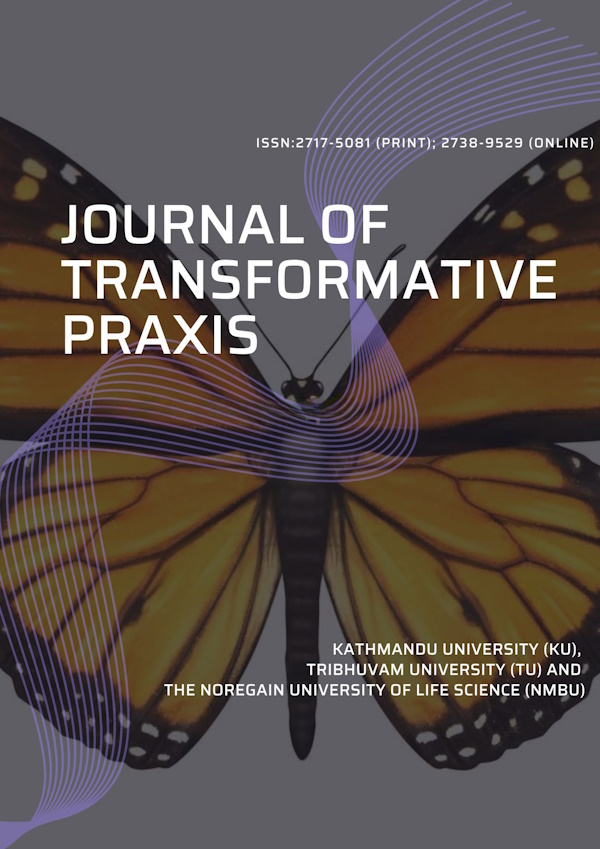
Mythic Content as a Rhetoric in Government-aided School Textbooks of Nepal
Original Article
Journal of Transformative Praxis, Volume 2, Issue 1, 2021, 32-45, https://doi.org/10.51474/jrtp.v2i1.522
Online publication date: Jun 30, 2021
Publication date: Dec 31, 2021
Views: 492 | Downloads: 317
How to cite this article
APA
In-text citation: (GC, 2021)
Reference: GC, S. (2021). Mythic Content as a Rhetoric in Government-aided School Textbooks of Nepal. Journal of Transformative Praxis, 2(1), 32-45. https://doi.org/10.51474/jrtp.v2i1.522
Reference: GC, S. (2021). Mythic Content as a Rhetoric in Government-aided School Textbooks of Nepal. Journal of Transformative Praxis, 2(1), 32-45. https://doi.org/10.51474/jrtp.v2i1.522
Vancouver
In-text citation: (1), (2), (3), etc.
Reference: GC S. Mythic Content as a Rhetoric in Government-aided School Textbooks of Nepal. Journal of Transformative Praxis. 2021;2(1):32-45. https://doi.org/10.51474/jrtp.v2i1.522
Reference: GC S. Mythic Content as a Rhetoric in Government-aided School Textbooks of Nepal. Journal of Transformative Praxis. 2021;2(1):32-45. https://doi.org/10.51474/jrtp.v2i1.522
AMA
In-text citation: (1), (2), (3), etc.
Reference: GC S. Mythic Content as a Rhetoric in Government-aided School Textbooks of Nepal. Journal of Transformative Praxis. 2021;2(1), 32-45. https://doi.org/10.51474/jrtp.v2i1.522
Reference: GC S. Mythic Content as a Rhetoric in Government-aided School Textbooks of Nepal. Journal of Transformative Praxis. 2021;2(1), 32-45. https://doi.org/10.51474/jrtp.v2i1.522
Chicago
In-text citation: (GC, 2021)
Reference: GC, Saroj. "Mythic Content as a Rhetoric in Government-aided School Textbooks of Nepal". Journal of Transformative Praxis 2021 2 no. 1 (2021): 32-45. https://doi.org/10.51474/jrtp.v2i1.522
Reference: GC, Saroj. "Mythic Content as a Rhetoric in Government-aided School Textbooks of Nepal". Journal of Transformative Praxis 2021 2 no. 1 (2021): 32-45. https://doi.org/10.51474/jrtp.v2i1.522
Harvard
In-text citation: (GC, 2021)
Reference: GC, S. (2021). Mythic Content as a Rhetoric in Government-aided School Textbooks of Nepal. Journal of Transformative Praxis, 2(1), pp. 32-45. https://doi.org/10.51474/jrtp.v2i1.522
Reference: GC, S. (2021). Mythic Content as a Rhetoric in Government-aided School Textbooks of Nepal. Journal of Transformative Praxis, 2(1), pp. 32-45. https://doi.org/10.51474/jrtp.v2i1.522
MLA
In-text citation: (GC, 2021)
Reference: GC, Saroj "Mythic Content as a Rhetoric in Government-aided School Textbooks of Nepal". Journal of Transformative Praxis, vol. 2, no. 1, 2021, pp. 32-45. https://doi.org/10.51474/jrtp.v2i1.522
Reference: GC, Saroj "Mythic Content as a Rhetoric in Government-aided School Textbooks of Nepal". Journal of Transformative Praxis, vol. 2, no. 1, 2021, pp. 32-45. https://doi.org/10.51474/jrtp.v2i1.522
ABSTRACT
This paper offers a critical and political reading of the excerpts of myths included in government-sponsored school-level language textbooks of Nepal, and looks at how the content is more prone to instilling particular values than to teaching skills of language competence. Drawing on insights and postulations from Critical Discourse Analysis in general, and dispositive analysis in particular, it examines values embedded in the excerpts as a discursive site for the practice of knowledge-making and power. Given that textbooks are a cultural production at large, and therefore textual, the paper explores how the reproduction of mythical content has given rise to the pedagogy that serves the teleological purpose of producing the desired type of possible citizenry by keeping the essentialities of modern education such as critical engagement, linguistic and cognitive skills, the questioning attitude and critical thinking at the disposal. The paper concludes that the particular way of designation of the content is likely to halt the basic aim of producing the learners as active and critical social agents for the broader social transformation, and calls for a revisit to mitigate the gap between the professed objectives and their materialization in language textbooks and make the learning content more goal-oriented.
REFERENCES
---
LICENSE
This work is licensed under a Creative Commons Attribution-ShareAlike 4.0 International License.
